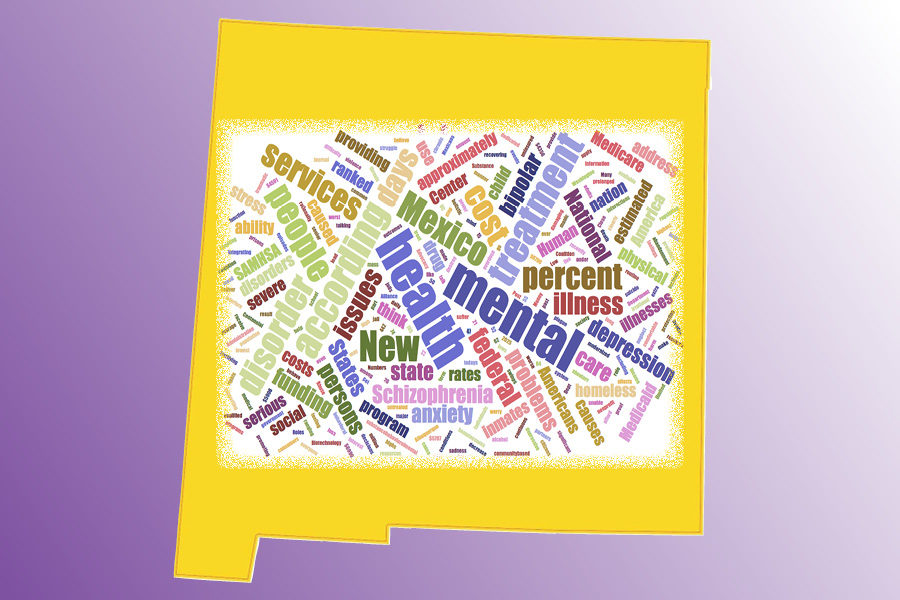Mental Health in New Mexico: High Numbers, Low Money
April 9, 2019
Most people are comfortable talking about physical problems, but few like to talk about the issues that can destroy the mind. Mental health disorders plague an estimated 18.5 percent of Americans, according to the National Alliance on Mental Illness. With issues in today’s society such as mass shooters, homelessness, and people in jail, do we ever stop to think that they may be caused, or made worse, by mental illness?
According to the National Coalition for the Homeless, an estimated 20-25 percent of homeless people suffer from severe mental illness. According to the Treatment Advocacy Center, approximately 20 percent of inmates in jails and 15 percent of inmates in state prisons have serious mental illnesses.
New Mexico on Mental Health
The Human Services Department recently modernized the New Mexico Medicaid system by integrating physical and behavioral health services in the Centennial Care program, which will help treat individuals in a more holistic manner. But according to The Albuquerque Journal, “New Mexico continues to lead the nation in damaging substance/behavioral/mental health outcomes. It has ranked among the worst in the nation for drug overdose death rates, suicide rates and mental health illnesses.” All of these problems, including child neglect, child abandonment, and even school shooting threats, can result in severe mental health issues that go untreated.
New Mexico has a population of approximately 2.1 million people. According to the Substance Abuse and Mental Health Services Administration (SAMHSA is part of the U.S. Dept. of Health and Human Services), “Close to 4.7 percent of adults in New Mexico live with serious mental health conditions such as schizophrenia, bipolar disorder, and major depression.“
According to SAMHSA, of the 98,700 New Mexicans who struggle with mental illness, only 44.2 percent receive any form of treatment. According to Mental Health America, New Mexico is ranked 22 out of 50 states (and Washington D.C.) for providing mental health services.
What are some common mental health disorders?
Anxiety is a feeling of worry that can interfere with a person’s daily routine. Depression causes prolonged feelings of sadness and/or a loss of interest that can decrease a person’s ability to function. Bipolar disorder causes episodes of mood swings ranging from depressive lows to manic highs. Schizophrenia affects a person’s ability to think clearly and behave rationally. Post traumatic stress disorder is caused by past stress, violence and harm and the difficulty of recovering from terrifying events. Social anxiety disorder is a chronic condition in which social interactions cause irrational anxiety.
Costs for Mental Health Treatment
The average cost to deliver mental health care was highest for Medicare and lowest for the uninsured, according to the National Center for Biotechnology Information: Schizophrenia treatment cost $5,707 for 7.4 days; bipolar disorder treatment cost $4,356 for 5.5 days; depression treatment cost $6,990 for 8.4 days; drug use disorder treatment cost $4,591 for 5.2 days; and alcohol use disorder treatment cost $5,908 for 6.2 days.
Federal and State Roles
The federal government partners with the states to address mental health. The federal role includes regulating systems and providers, protecting the rights of consumers, providing funding for services, and supporting research on it, according to Mental Health America, a community-based nonprofit dedicated to promoting the mental health of all Americans. States have a significant amount of power to make decisions about their mental health systems.
How Can We Get More Funding?
Medicaid is a federal and state program that helps with medical costs for people with limited income and resources while Medicare is available to senior citizens. Many people believe that everyone should be qualified to apply for these programs as long as they provide proof that they are unable to afford the needed treatment. The extra funding to boost mental health care could also be directed toward more awareness and charity efforts to support people who are experiencing issues, problems that they are too afraid to address out loud.


